When choosing the right to perform certain tasks screwdriver is necessary to pay attention to the different characteristics. Among them are not only the most important power of the device and its battery capacity, but the battery voltage, and even torque.
During construction and repair screwdriver is an indispensable tool, simplifying the tightening of various types of fasteners, and sometimes - drilling holes. AND, despite, that there are two versions of this device - network and storage, more often it is the latter option is chosen to carry out household tasks. At the same time it draws attention to the parameters of power and such characteristics, the voltage Screwdriving, its capacity, torque and battery capacity. Each of these parameters is important to evaluate and select the right device. While buying one because only a suitable power or voltage is not necessary.
The main parameters of the battery and the tool itself
The main parameters of the, which is characterized by the work of screwdriver, a battery voltage, from which, in turn, It depends on the motor power and torque. For domestic models Unlike screwdrivers for small voltage - an average, it is in the range of 10,8-14,4 In. More productive options, designed for continuous use, can be equipped with batteries to 24-36 volts.

It depends on the battery voltage from the battery and the screwdriver type - answer, What's the Difference, can, knowing, which metals used for its manufacture. For nickel-cadmium batteries, large in size with a similar capacity, index value is a multiple of 1,2 AT (it is the voltage of one cell, that make up the battery pack), for lithium-ion - 3,6 AT.
Among the others, no less important characteristics can be noted:
- torque, whose value can be one of the main answers to the question, what affects the voltage of the battery screwdriver. By this characteristic can be defined as the diameter, and the length of swirl of the screw or the screw. For a lot of fasteners, as well as for drilling deep and wide holes, and solid materials, and it requires serious torque value. Torque - enough to house models 12-15 nm (maximum 30 nm), professional - from 30 nm. This parameter is important, look for him.
- If the maximum speed is below 1000 rev / min, tool will be convenient to tighten the screws and drill soft materials (tree, metal, plastic). If you are going to drill metal, Choose a model with a higher turnover 1500 rev / min. They will have two speeds: The first - for fixing, second - for drilling.
- For continuous operation (installation of gypsum plasterboard, clapboard sheathing) Choose network screwdrivers with depth stop. To work at home go up and network and storage model, so choose something, like more.
There are two types of torque screwdrivers - starting (larger in size and is required to run the unit in operation) and permanent, that is working. The value of the parameter in contemporary models of equipment can be adjusted - to learn, how many modes you can select a particular device, can be found in the documentation available to it. And, from tools with pulse operation mode (inclusion rotating part spurts) opportunities for screwing more - allowing time to time to increase the torque, they can screw the screw larger image.
Issued to the torque value in the electric motor is not constant and depends, Firstly, the motor speed, The higher turnover, the lower shaft torque.
In addition to the voltage and power screwdriver should be evaluated and battery capacity. Characteristics measured in ampere-hours or milliamp-hours. The larger figure, the longer it will be able to work without recharging screwdriver.
Average Battery Capacity household model is 1300 mAh, which lasts for 2-3 hours. Professional equipment requires more time of work - and the master, which enjoys a screwdriver for a whole working day, should buy a model with a battery already from 1.5-2.0 Ah and more.
What better lithium battery or nickel-cadmium
This question is about, a better battery for the screwdriver, It puts not entirely correct. It all depends on the situation and the length of time, during which the tool will be used.
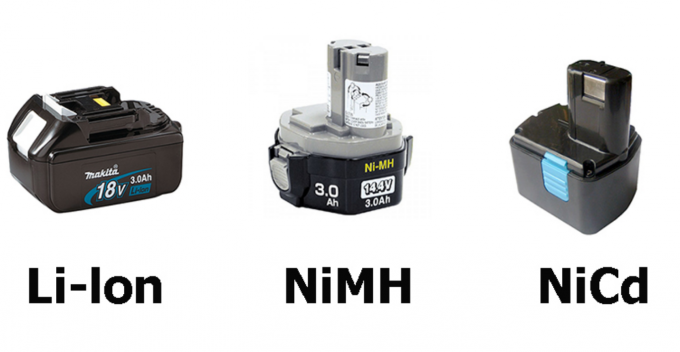
A variety of batteries due to the fact, in that the electrodes and electrolytes can be used various chemical elements. The correct choice depends on the energy storage performance used power tools. in the field of electrical appliances most widely used following 3 species:
- Nickel-cadmium (Ni-Cd);
- NiMH (Ni-MH);
- Lithium-ion (Li-Ion); Lithium Polymer (Li-Pol).
The lithium battery pack weighs less with the same capacity indicators, that cadmium. But this is not the main indicator, based on which the battery should be selected for the screwdriver.
certainly, number of charge-discharge cycles for the elements cadmium a fraction, than that of lithium. Standard for the Ni-Cd is 500, but for Li - 1500, what, certainly, initially suggests that, that lithium batteries are much better and lighter in weight.
When choosing the batteries it is important to take into account the fact, that aging the nickel-cadmium batteries depends entirely on developed their cycles, rather than their actual age!
The service life of the lithium-ion battery, unlike the cadmium, it depends on the age of years. Through 3 It has already come down, even if they are not used.
Nickel-cadmium battery, in front of, will live for a long time even in the case, if they were used rarely.
for example, when buying a screwdriver, Used, it is not necessary to take it with a Lithium battery. There is a large proportion of the probability of, that if, If the instrument is not used for a long time, or has been subjected to freezing often, its battery pack is already unusable.
If the boo "Shura" is sold with cadmium batteries, they can save up to 60% charge, regardless of, working was a tool or not.
If the screwdriver is not used very often, Lithium batteries soon "grow old", otsluzhat than their positions 1500 cycles. Therefore, it makes no sense to buy a tool with lithium batteries for periodic household use.
Cadmium can be from 3 to 5 years old, regardless of, used batteries, or not. He also could easily lie in a warehouse, preserving their properties, Unlike lithium. If you do not plan to use the screwdriver often, the answer to the question of, how to choose a battery, be concise and truthful: choose cadmium.
by the way, when cold to -20 ° C cadmium "behaves" better, than lithium batteries, who do not like big frost. Lithium should be stored in a charged state, least, on 60%. They need constant recharging, If not used. Otherwise, they begin to break down.
Thus it becomes clear, nickel-cadmium batteries, in fact, no worse than lithium. The main question is only in the field of application of both types of chemical batteries.
When you use each of them at the right time and in the right place and the, and others may be equally useful and good.
Ni-MH Batteries
Nikel─metallogidridnye less common batteries, than the nickel-cadmium battery Screwdriver.
These benefits should include the absence of toxic components, environmentally friendly production, negligible "memory effect" and a smaller self-discharge, than that of nickel-cadmium batteries.
Besides, when compared with Ni─Cd batteries, nikel─metallogidridnye have greater capacity and can withstand a greater number of charge-discharge cycles.
Ni-MH battery has the following advantages: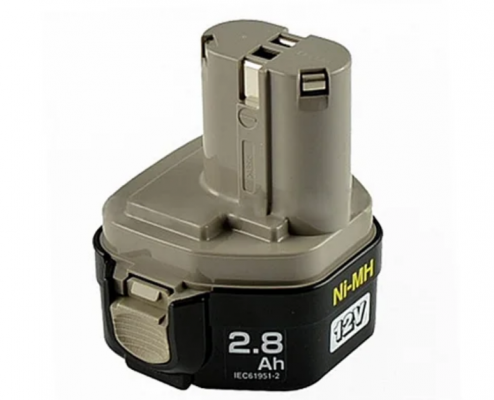
- they practically inherent memory effect;
- in their manufacture do not use toxic components;
- simple disposal; capacity to 30% more, than that of nickel-cadmium; Lightweight and compact; not afraid of mechanical damage.
Minuses:
- long charged; 500-600 charge-discharge cycles;
- after 300 cycles can be observed capacity loss;
- must not be operated at low temperatures;
- can not be fully discharged; the higher cost compared to the previous view.
Store NiMH batteries must be charged half and in a cool place.
Lithium-ion (Li ion). Most modern batteries
Reflecting on, how to choose a cordless screwdriver, note, that the most advanced lithium-ion batteries also have their pros and cons.
We list them dignity:
- low weight and dimensions;
- specific capacitance twice, than Ni-Cd;
- no memory effect;
- a large number of charge-discharge cycles (to 700);
- low self-discharge: (3-6% per month);
- easy maintenance (do not require strict adherence to the charge mode and discharge);
- fast charging (average 30-40 minutes).
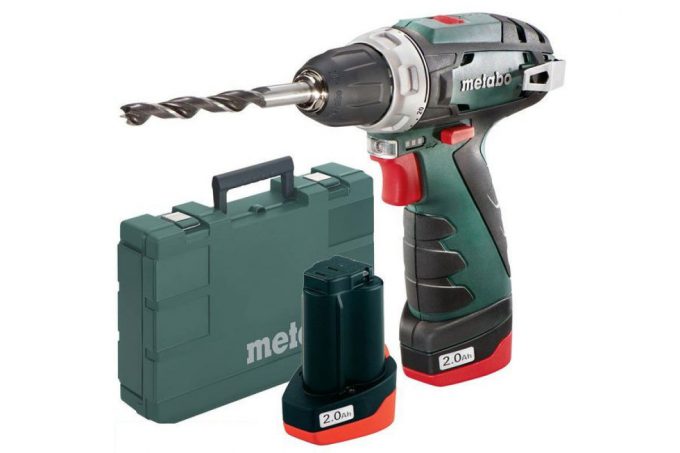
Disadvantages they also have and are serious enough:
- Do not work at temperatures below zero;
- not recovered;
- Low duration of "life" (maximum 2 of the year). And, battery age is counted not from the date of commencement of operation, as from the date of production (so buy only "fresh").
- Danger of explosion and fire;
- Full discharge displays battery failure (an attempt to re-charge it may cause an explosion);
- Sensitivity to overheating or shock;
- High price.
One more important thing, to keep in mind - keeping a cordless screwdriver. Nickel-cadmium batteries can be stored in a discharged. Nickel- MH, conversely, before long-term storage (a few months) You must fully charge.
About the lithium-ion batteries need to be discussed separately: they do not care, charged or discharged, you will keep them. but, remember that, that they quickly "grow old". So buy an instrument with such power sources are not for one-time work, and intensive use. Within 1 year lithium battery will lose about 30% of its original capacity, and through 2 , the battery should be thrown out.
select the Features
As known, professional screwdrivers have greater value, but it is not accidental. They are made with a large margin of safety, Why use a high-quality and expensive materials. Besides, they have more power, which makes it possible to screw the longer screws and / or work with more rigid materials.
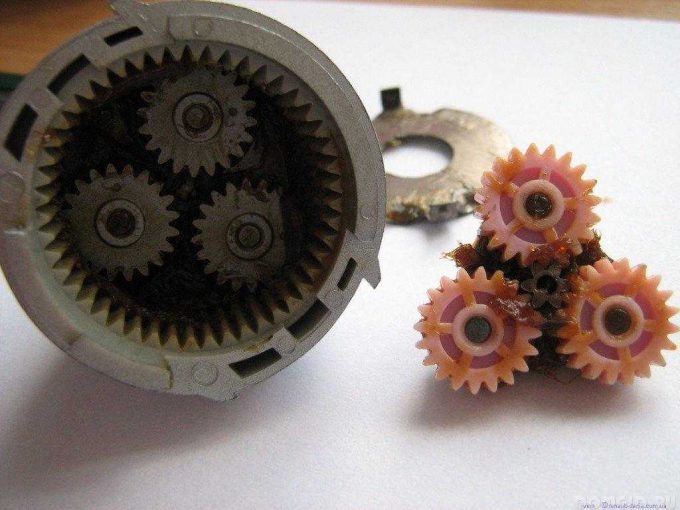
To solve consumer or professional screwdriver you need, appreciate the amount of work, which will need to perform. If you start construction or major repairs, probably, We need a professional or semi-professional model. If you need a tool will periodically - something unscrew / tighten from time to time, household is more than enough. With this tool the pros resource simply will not be in demand. So choose a screwdriver for this criterion is not very difficult.
When choosing a power necessary to take into account not only the, how much power screwdriver is listed in the manufacturer's information. Because of too much performance device can tighten the screws too much, pushing their hat into the surface. As a result, the appearance of the coating is spoiled, and fasteners, if necessary, it is practically impossible to unscrew.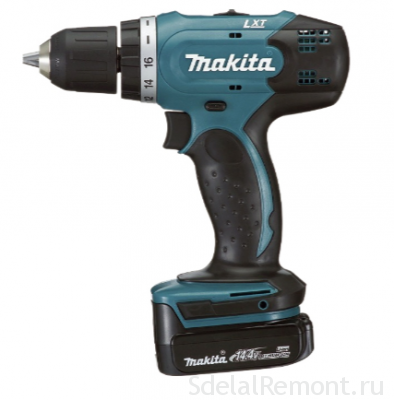
choosing, a voltage is better for the screwdriver, should be considered, that stress is the main instrument parameters. So, eg, motor power screwdriver Makita DDF343SHE is 700 W, at a voltage of 14.4V and battery capacity 1300 mAh and torque 36 nm. Whereas other models Hammer ACD182 weaker engine (22 nm) and a capacious battery (1200 mAh) - and, it seems, that this device is less about 40%. However, due to the voltage 18 The "Hammer" is able to tighten the fasteners longer without recharging, even outperformed by the battery capacity.
Understand, why less productive at first glance screwdriver gives a more powerful, can, Do some calculations:
- amount of energy, stored by the first model of the same 1,2 x 1,8 = 21,6 W·no;
- The second indicator of all 1,3 x 14,4 = 18,72 W·no, ie. on 15,4% less.
In the selection process it is desirable to consider the presence screwdriver supplied thereto spare battery. Some models even have 2 extra batteries. One side, such equipment will be more expensive (especially since the cost of the battery is up to 80% the price of the equipment), but to work with it will be much more convenient. At the same time to perform household tasks extra battery is not needed - the time performed with the help of work is rarely more than 1-2 hours. While in the process of constant use screwdriver (eg, for repairing or assembling furniture) second battery can not interrupt work longer, than a few minutes. A discharged battery is placed on charge, and a spare set in the instrument.
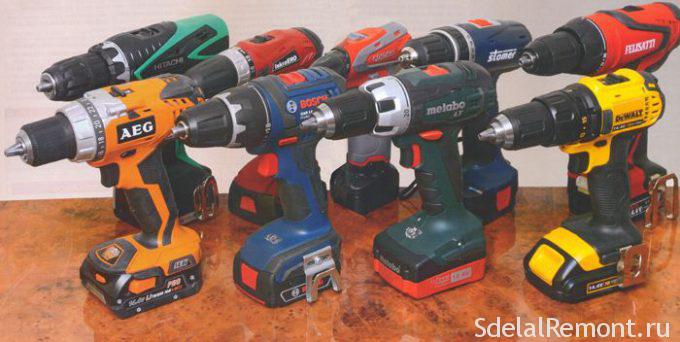
Without the need for extensive studies, which may require screwdriver, buy a model with extra batteries is not recommended, not only because of its higher cost. Just the service life of the battery is small, and after a couple of years, the user will have to buy a new part, without using up even half the old resource.
Summarizing
It is not necessary to seek to purchase the most powerful tool. When excess power you will be screwed in the screws too much, hat is beneath the surface, which spoils the appearance and difficult unscrewing screws, if the need arises.
Before choosing, how much power screwdriver is right for you, should decide, the purposes for which the tool will be used. For lack of use in the home workshop will approach a simple low-power tools, with 12V, 1.5Ach capacity and maximum torque moments 25Nm. Such a tool can work in assembling furniture and twist small screws for mounting home interior items (curtains, paintings, etc.).
Always try to choose a screwdriver, 2 batteries included, because the battery is an expensive spare part.
It is worth noting, that battery power screwdriver, although it is an important parameter in the selection of a suitable model, much more important indicators of the voltage, capacity and battery type. And pay attention to the torque often costs only, if using it will be not only screwing, but drilling. You should also know, that the maximum capacity of the battery screwdriver from all commercially available models in the device with a voltage 36 AT, moment 60 Nm and capacity 3000 mAh. Such equipment is quite difficult and not too easy to use on a daily basis without having professional experience. BUT, so, should opt for the less productive options, produced by known brands and reliable type Bosch, Hitachi, Makita, TIME, Dewalt и Metabo. Even if you buy a small screwdriver screwdrivers performance data model will serve for many years.












